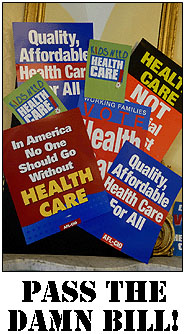 As told by E.J. Dionne, this is a brilliant extended metaphor for why Democrats need to pass healthcare reform. It’s about Rep. Jay Inslee (D–Wash.), who lost his House seat after the failure of healthcare reform in 1994 and then won it back four years later:
As told by E.J. Dionne, this is a brilliant extended metaphor for why Democrats need to pass healthcare reform. It’s about Rep. Jay Inslee (D–Wash.), who lost his House seat after the failure of healthcare reform in 1994 and then won it back four years later:
He recounted all the grief he and his family went through while work on their kitchen renovation dragged on and on and on. “During that time, I had blood lust against my contractor,” Inslee said. “Six months went by, and he was still arguing with the plumber. Eight months went by, and there were still wires hanging down everywhere, and he was having trouble with the building inspector.”
But eventually, the job got done. “And now I love that kitchen,” Inslee recalls saying. “I bake bread in that kitchen. My wife cooks great meals in that kitchen. The contractor’s now a buddy of mine, and I’ve had beers with him in that kitchen.”
Inslee looked at his colleagues and declared: “We’ve got to finish the kitchen.” His point was that Americans won’t experience any of the benefits of health-care reform until Congress puts a new system in place.
I called Inslee about his kitchen oration after Rep. David Wu (D-Ore.) told me it was one of the turning points in calming Democrats’ nerves. “Now,” Wu says, “people run into him in the hallway, smile and say, ‘Finish the kitchen.’ “
Anyone who’s ever had any contracting work done understands this sentiment instantly. Likewise, everybody hates the legislative process while it’s underway. But once healthcare reform becomes law, the storm will begin to blow over and everyone will start to focus instead on the real, concrete benefits of the bill and the people who made them into reality. And just to remind of you what those benefits are, here’s the nickel summary again:
- Insurers have to take all comers. They can’t turn you down for a preexisting condition or cut you off after you get sick or lose your job.
- Community rating. Within a few broad classes, everyone gets charged the same amount for insurance.
- A significant expansion of Medicaid.
- Subsidies for low and middle income workers that keeps premium costs under 10% of income.
- Limits on ER charges to low-income uninsured emergency patients.
- Mandates minimum levels of coverage.
- Caps on out-of-pocket expenses.
- A broad range of cost-containment measures.
- A dedicated revenue stream to support all this.
Pass the bill. And the sooner the better. It’s time to have a real accomplishment under our belts, not a bunch of exposed sheetrock and arguments over when it’s going to be finished.


















